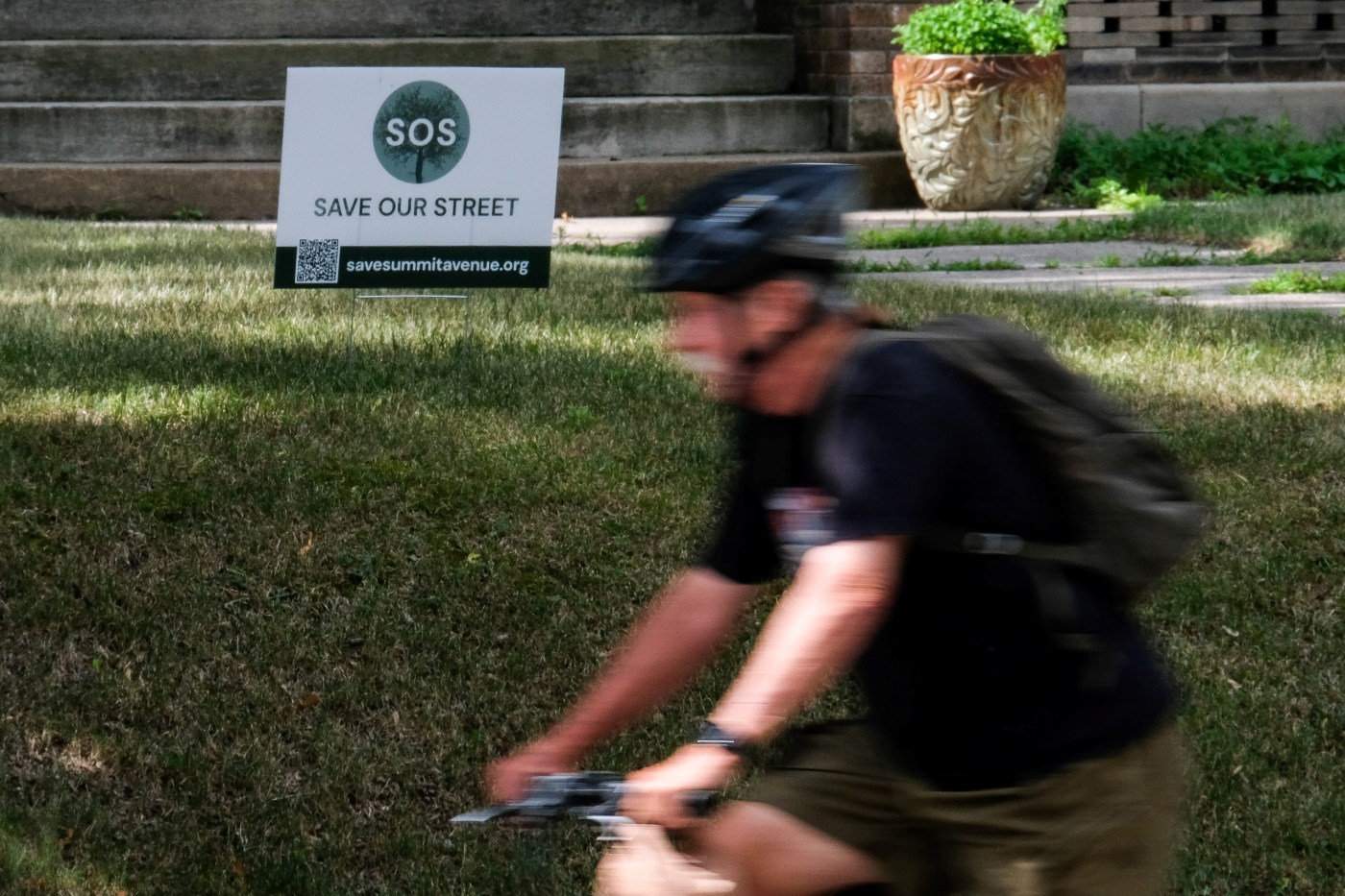
Ramsey County judge: St. Paul violated Data Practices Act 14 times, must pay bike trail opponent
A Summit Avenue homeowner’s efforts to gather copious information about a proposed sidewalk-level bicycle trail has earned him legal damages from the city of St. Paul, which will have to pay at least $1,000 for each of 14 violations of the Minnesota Government Data Practices Act, according to a recent judicial ruling.
The order from Ramsey County District Judge Patrick Diamond includes a curveball — exact amounts will be determined at trial, and could yield up to $15,000 per violation.
“There’s no precedent here. No one’s ever ruled on this before, I’m quite certain,” said Bob Cattanach, the plaintiff in the lawsuit and a partner with the law firm of Dorsey and Whitney. “This is the first time these (damages) have been awarded in the state. He’s breaking new ground.”
Cattanach represented himself in a lawsuit against the city, claiming St. Paul had failed to provide complete data based on 17 public information requests related to the proposed Summit Avenue bike trail. City officials have maintained that they’ve dutifully produced hundreds of emails, studies and other data in response to his back-to-back records requests about the 4.7-mile trail, with some information dating back more than 10 years.
‘Exemplary damages’
Cattanach filed suit in March 2023 in Ramsey County District Court, claiming willful violations of the state’s data practices act, which requires the city to “keep records containing government data in such an arrangement and condition as to make them easily accessible for convenient use.”
While acknowledging that the state standard was not particularly specific about what constitutes easy accessibility, Diamond on Tuesday largely agreed that the city had failed to meet that standard, and that Cattanach was entitled to “exemplary damages” intended to underscore the court’s disappointment with how the city handled his records requests. Diamond said the minimum award for each of 14 violations would be $1,000 and the maximum would be $15,000 per violation, but determining the exact amount would require a trial.
The judge “probably wants to hear why they did a search this way, rather than this other way,” said Cattanach on Tuesday. “I think it could have been much worse for them, but I’m hardly an unbiased observer.”
City Attorney Lyndsey Olson on Tuesday said the city is reviewing its next steps.
“The city takes issue with the court’s determination that it committed willful violations of the data practices act,” said Olson, in a written statement. “The city maintains that all efforts have been made to comply with the data practices act and provide plaintiff with the data requested in a timely manner.”
Open Data portal limits requests
Among the court’s concerns, the city maintains an “open data” website where the public can enter requests for information, department by department, but searches were not “conducted for responsive data outside the referred department,” so there was no logical way to submit a master request across all city departments at once. Just as troubling to the court, there was no evidence that a “responsible authority or designee had come up with plan to do so in this case, or that policy, practice, procedure, or training had so directed.”
Given the potential impact to “hundreds of trees along Summit Avenue” and “the existing historic symmetrical streetscape,” Cattanach’s March 2023 lawsuit sought a temporary injunction delaying a public hearing on the bike trail, though that effort was not successful for him. The court said at the time it was difficult to find precedent to stop the city council from holding a vote, and the trail was approved in May 2023 by a vote of 6-1. The project has yet to be funded.
“The real purpose of the data practices act is to give people access to information that helps them make their case in front of a public body, and I never got the opportunity to do that here,” Cattanach said. “All they had to do was give me the documents and postpone the hearing a few weeks.”
Request for public data
Among Cattanach’s requested information in the months prior was all “public data created, produced, received, maintained or disseminated from January 1, 2020, to present regarding all analysis, studies or documentations that were done, if any, to assess the suitability of alternatives other than Summit Avenue … including but not limited to Jefferson (Avenue) and Marshall (Avenue) and any east-west street between them.”
He also submitted a request for all studies or public data that were used to compare the potential hazards to cyclists between the proposed plan and existing in-street bike lanes, on top of three other requests related to traffic volumes, a potential Environmental Assessment Worksheet and the design between Lexington Parkway and Victoria Street.
In response, the city produced a document indicating that Grand Avenue, Portland Avenue, Marshall Avenue, Selby Avenue, Ayd Mill Road and Jefferson Avenue had all been evaluated “at a high level,” and that each route had been found to be less than ideal for varied reasons, including obstructions, narrow right-of-way conditions and the lack of parkway characteristics for recreation.
“I realized I was only getting Parks and Rec(reation) documents,” Cattanach said. “Where were the Public Works docs? That’s when I realized I would have to resubmit my request.”
Cattanach then requested communications and studies that had been used to support those arguments, including text messages and emails to city consultants or members of the St. Paul Bicycle Coalition.
He later requested documents related to potential funding for the bike trail, including communications with members of the Metropolitan Council, the metro’s regional planning agency, and emails and text messages between a city traffic engineer and a Grand Avenue toy store owner supportive of the trail, among other text-based conversations.
Related Articles
Man shot at busy St. Paul bus stop in robbery of his e-bike
‘Keeping baby bottoms covered’: Diaper Bank of Minnesota grows to meet family needs
St. Paul: Third Street/Kellogg Bridge reconstruction to get underway as elected officials mark the occasion
Minneapolis carjacking and shooting suspect charged with fleeing St. Paul police, hitting house
Q&A: Suzanne Kelly, new CEO of Minnesota Council of Churches, wants to build a faith community ‘that makes people feel whole’

